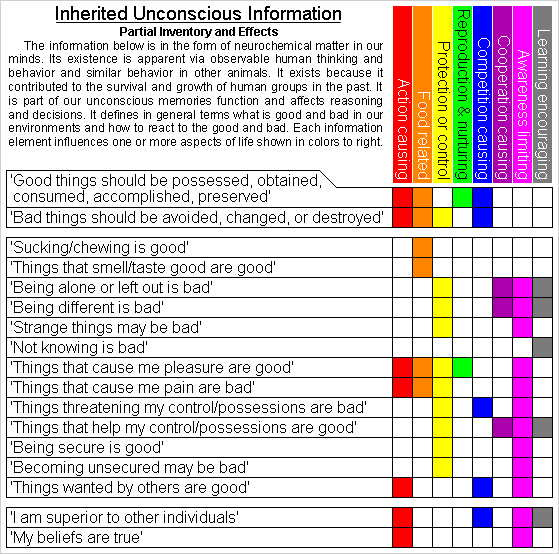|
Thinking and Beliefs
Many people are not aware that our minds contain a large amount of unconscious information which affects our thinking and behavior. Unconscious information causes us to cough, sneeze, and blink to keep unwanted things out of our bodies without consciously thinking about doing these things. It causes infants to find nourishment and adults to reproduce without having to think consciously -- or even in spite of conscious contrary thinking. It is less obvious that unconscious information causes people to be certain of beliefs even when obvious evidence shows the beliefs are probably false. Recently TIME magazine had an article about a possible "god gene" which has been identified and may cause people to believe in a god. And Reg Morrison's excellent book, The Spirit in the Gene (Cornell University Press, 1999) provides an alarming analysis of the consequences of our genes. The inherited information shown in the table is not the direct result of specific genes. It is the indirect result of the combined influence of many genes. It is the result of the configuration of the matter comprising our minds. For example, the unconscious information, 'My beliefs are true' may be due in part to our brains having only one neurological configuration at any particular time. This configuration results in certain perceptions of reality and beliefs about reality. The configuration tends to become reinforced and persist unless one works to avoid this or has a belief-changing experience. The adage, "You can't teach old dogs new tricks" reflects the fact that, as a mind evolves during an animal's lifetime, its thinking becomes less flexible. We tend to get into mental ruts as it becomes harder for our minds to change their organization. An antidote to overconfidence in one's beliefs is to have a conscious, reasoned belief, "My beliefs may be wrong." As Disraeli observed, "To be conscious that you are ignorant is a great step to knowledge." But this is easier said than done when our thinking is biased by powerful inherited information. People who pride themselves on what they know are not inclined to doubt what they know. Doubting one's knowledge is inconsistent with 'I am superior to other individuals' and 'My beliefs are true.' Doubting the knowledge of one's groups -- social, political, religious, or other groups -- is inconsistent with 'Being different is bad' and 'Being alone or left out is bad.' 'I am superior to other individuals' has caused untold misery and grief. It is constantly working within us. We go to great lengths to try to confirm this information. People are motivated to purchase things or do things that make them feel superior. We identify with sports teams (particularly winning teams) or ethnic groups or organizations that can make us feel superior. We are constantly looking for evidence of our superiority or the superiority of the things and groups with which we identify. Sadly, people can enjoy seeing others fail when it makes them feel superior. Humor is closely connected with our unconscious information. Often it seems humorous when we see someone in conflict with their unconscious information -- such as someone slipping on a banana peel or otherwise 'becoming unsecured' and 'losing control.' It tends to be more humorous when someone with self-perceived superiority loses control. When we make a social blunder or slip and fall or are otherwise in conflict with our unconscious information, it helps to see the humor in it. But again, it's easier said than done. Our unconscious information is the root cause of most of the harmful characteristics of human societies -- hunger and starvation, the AIDS pandemic, widespread obesity, the decline in moral standards, terrorism, the great influence of audio-visual information on people, our herd instinct which contributes to booms and busts in financial and real estate markets, greed, vanity, lying, etc., etc. Businesses, especially media businesses, have learned to profit via advertising and programming that resonates with our unconscious information. In exploiting the public's unconscious information, advertising and media businesses have changed the way people think and act and thus changed the norms of society and the environments of most people. People have become more self-centered -- not more innately self-centered but more consciously self-centered -- as the norms of society changed. People's unconscious information has gotten the better of their reasoning ability which it more-or-less controls. If people could become aware of the unconscious information affecting their thinking and behavior, they would be less perplexed about what is causing the thinking and behavior of the people with whom they disagree. It would help us all arrive at realistic views of reality which would cause changes in thinking and behavior which would help our environments that affect everyone. It would change people's value systems. The table indicates that much of the powerful unconscious information in our minds works against improving our awareness. It biases our perceptions and causes us to select evidence which is consistent with our unconscious information. Granted, there is information causing the innate curiosity that helped our ancestors learn and that helps advance science. But other, more-powerful information inhibits our willingness to question our knowledge and beliefs. If, as Aristotle says, "There is only one good, knowledge, and one evil, ignorance," and if our unconscious information inhibits our ability to improve our knowledge, then does it not make sense to create more awareness of the unconscious information that is causing ignorance and limiting, if not destroying, our civilization? † The symposium was organized by Lynn Margulis and Roger Payne and held during the 1991 annual meeting of the American Association for the Advancement of Science.
|

